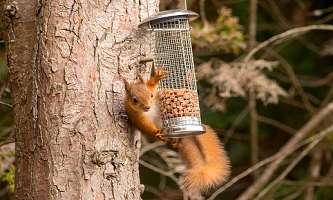Study looks to safeguard red squirrels' future

Researchers are embarking on a new project aimed at helping to safeguard the future of the red squirrel in the UK.
The Nottingham Trent University study is investigating how red squirrels currently utilise and exploit urban environments – so that this information can be used to help better manage these habitats to their advantage.
There are thought to be about 140,000 red squirrels left in the UK, with numbers dwindling as a result of being outcompeted by the hardier grey squirrel, which was introduced from the United States in the late 1800s.
Using Formby in Merseyside as their study site – a stronghold for red squirrels – the researchers will examine the reds' patterns of movement and their home ranges.
They will also investigate the effects of living in close proximity to humans, such as activities and opportunities for supplementary feeding and hotspots linked to traffic mortality.
The impact upon squirrel populations of the gradual removal of trees in nearby residential gardens – a high-quality habitat for the reds – will be studied as part of the four-year project, which also involves Lancashire Wildlife Trust and National Trust Formby.
The work will involve using tracking technology to monitor movements in nearby gardens and woods. Questionnaires to volunteers will assess how and when they currently feed the reds and their thoughts on squirrel conservation generally.
Any dead red squirrels found during the study will also be tested for disease and cause of death.
Red squirrels have suffered since the introduction of the non-native greys.
Grey squirrels carry the squirrelpox virus – a disease which is harmless to them but can kill reds in just a few weeks, and they can also digest seeds such as acorns more efficiently which provides them with additional food sources.
"We hope that this study will provide us with crucial insight into the urban ecology and conservation of the UK's red squirrels," said Kat Fingland, a researcher in Nottingham Trent University's School of Animal, Rural and Environmental Sciences.
She said: "We want to take all the information we gather on how red squirrels exploit urban habitats and resources and use it to develop a strategy for managing urban areas for their benefit.
"We could look to develop new urban refuges for reds, encouraging them to disperse into neighbouring towns, and help to find new ways for them to thrive alongside people."
Kate Martin, Lead Ranger at National Trust Formby, said: "It's great to have this study taking place at Formby. Our red squirrel population lives in the coastal pinewoods but is quite close to the urban fringe of Formby town – and of course lots of visitors. We'll be very interested to see the results of Kat Fingland's work."
Provided by Nottingham Trent University



















